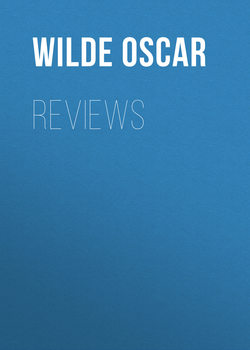Читать книгу Reviews - Оскар Уайльд, Wilde Oscar, F. H. Cornish - Страница 31
THE POETS’ CORNER – I
Оглавление(Pall Mall Gazette, September 27, 1886.)
Among the social problems of the nineteenth century the tramp has always held an important position, but his appearance among the nineteenth-century poets is extremely remarkable. Not that a tramp’s mode of life is at all unsuited to the development of the poetic faculty. Far from it! He, if any one, should possess that freedom of mood which is so essential to the artist, for he has no taxes to pay and no relations to worry him. The man who possesses a permanent address, and whose name is to be found in the Directory, is necessarily limited and localised. Only the tramp has absolute liberty of living. Was not Homer himself a vagrant, and did not Thespis go about in a caravan? It is then with feelings of intense expectation that we open the little volume that lies before us. It is entitled Low Down, by Two Tramps, and is marvellous even to look at. It is clear that art has at last reached the criminal classes. The cover is of brown paper like the covers of Mr. Whistler’s brochures. The printing exhibits every fantastic variation of type, and the pages range in colour from blue to brown, from grey to sage green and from rose pink to chrome yellow. The Philistines may sneer at this chromatic chaos, but we do not. As the painters are always pilfering from the poets, why should not the poet annex the domain of the painter and use colour for the expression of his moods and music: blue for sentiment, and red for passion, grey for cultured melancholy, and green for descriptions? The book, then, is a kind of miniature rainbow, and with all its varied sheets is as lovely as an advertisement hoarding. As for the peripatetics – alas! they are not nightingales. Their note is harsh and rugged, Mr. G. R. Sims is the god of their idolatry, their style is the style of the Surrey Theatre, and we are sorry to see that that disregard of the rights of property which always characterises the able-bodied vagrant is extended by our tramps from the defensible pilfering from hen-roosts to the indefensible pilfering from poets. When we read such lines as:
And builded him a pyramid, four square,
Open to all the sky and every wind,
we feel that bad as poultry-snatching is, plagiarism is worse. Facilis descensus Averno! From highway robbery and crimes of violence one sinks gradually to literary petty larceny. However, there are coarsely effective poems in the volume, such as A Super’s Philosophy, Dick Hewlett, a ballad of the Californian school, and Gentleman Bill; and there is one rather pretty poem called The Return of Spring:
When robins hop on naked boughs,
And swell their throats with song,
When lab’rers trudge behind their ploughs,
And blithely whistle their teams along;
When glints of summer sunshine chase
Park shadows on the distant hills,
And scented tufts of pansies grace
Moist grots that ’scape rude Borean chills.
The last line is very disappointing. No poet, nowadays, should write of ‘rude Boreas’; he might just as well call the dawn ‘Aurora,’ or say that ‘Flora decks the enamelled meads.’ But there are some nice touches in the poem, and it is pleasant to find that tramps have their harmless moments. On the whole, the volume, if it is not quite worth reading, is at least worth looking at. The fool’s motley in which it is arrayed is extremely curious and extremely characteristic.
Mr. Irwin’s muse comes to us more simply clad, and more gracefully. She gains her colour-effect from the poet, not from the publisher. No cockneyism or colloquialism mars the sweetness of her speech. She finds music for every mood, and form for every feeling. In art as in life the law of heredity holds good. On est toujours fits de quelqu’un. And so it is easy to see that Mr. Irwin is a fervent admirer of Mr. Matthew Arnold. But he is in no sense a plagiarist. He has succeeded in studying a fine poet without stealing from him – a very difficult thing to do – and though many of the reeds through which he blows have been touched by other lips, yet he is able to draw new music from them. Like most of our younger poets, Mr. Irwin is at his best in his sonnets, and those entitled The Seeker after God and The Pillar of the Empire are really remarkable. All through this volume, however, one comes across good work, and the descriptions of Indian scenery are excellent. India, in fact, is the picturesque background to these poems, and her monstrous beasts, strange flowers and fantastic birds are used with much subtlety for the production of artistic effect. Perhaps there is a little too much about the pipal-tree, but when we have a proper sense of Imperial unity, no doubt the pipal-tree will be as dear and as familiar to us as the oaks and elms of our own woodlands.
(1) Low Down: Wayside Thoughts in Ballad and Other Verse. By Two Tramps. (Redway.)
(2) Rhymes and Renderings. By H. C. Irwin. (David Stott.)
